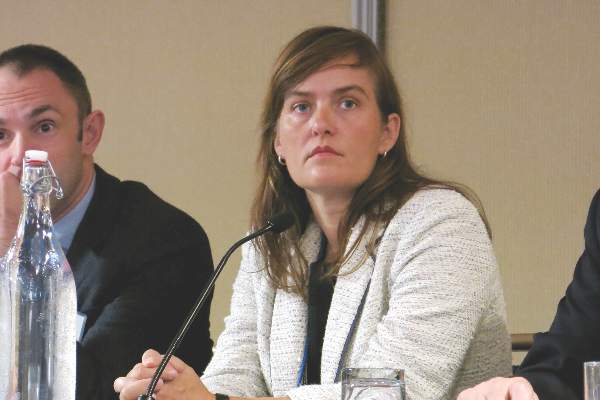User login
CHICAGO – Functional abdominal pain (FAP) is one of the most common complaints seen in pediatric and pediatric gastroenterology practices – but does that pediatric condition put patients at risk for similar problems as adults?
The worldwide prevalence of FAP in children is about 13.5%, with more than one in three children reporting weekly abdominal pain. Although that FAP often disappears over time, new research suggests that childhood FAP increases the risk for adult problems.
Indeed, roughly 30%-40% of children with FAP will go on to become adults with irritable bowel syndrome (IBS) or another functional gastrointestinal disorder (FGID), according to Miranda van Tilburg, Ph.D., of the department of gastroenterology and hepatology, University of North Carolina at Chapel Hill.
A recent prospective, longitudinal study reported that 41% of pediatric FAP patients met the symptom criteria for Rome III FGID at follow-up evaluation an average of 9.2 years after initial diagnosis. The most common FGID at follow-up was IBS (Clin Gastroenterol Hepatol. 2014 Dec;12[12]:2026-32).
Children with FAP will transition into adult care, and adult gastroenterologists need to be ready to attend to these patients and the specific issues they bring, Dr. Tilburg said at the meeting sponsored by the American Gastroenterological Association. In a video interview, Dr. van Tilburg discussed this subset of children whose FAP persists into adulthood, and what clinicians can do to care for these patients.
Dr. van Tilburg reported having no relevant conflicts of interest.
The video associated with this article is no longer available on this site. Please view all of our videos on the MDedge YouTube channel
CHICAGO – Functional abdominal pain (FAP) is one of the most common complaints seen in pediatric and pediatric gastroenterology practices – but does that pediatric condition put patients at risk for similar problems as adults?
The worldwide prevalence of FAP in children is about 13.5%, with more than one in three children reporting weekly abdominal pain. Although that FAP often disappears over time, new research suggests that childhood FAP increases the risk for adult problems.
Indeed, roughly 30%-40% of children with FAP will go on to become adults with irritable bowel syndrome (IBS) or another functional gastrointestinal disorder (FGID), according to Miranda van Tilburg, Ph.D., of the department of gastroenterology and hepatology, University of North Carolina at Chapel Hill.
A recent prospective, longitudinal study reported that 41% of pediatric FAP patients met the symptom criteria for Rome III FGID at follow-up evaluation an average of 9.2 years after initial diagnosis. The most common FGID at follow-up was IBS (Clin Gastroenterol Hepatol. 2014 Dec;12[12]:2026-32).
Children with FAP will transition into adult care, and adult gastroenterologists need to be ready to attend to these patients and the specific issues they bring, Dr. Tilburg said at the meeting sponsored by the American Gastroenterological Association. In a video interview, Dr. van Tilburg discussed this subset of children whose FAP persists into adulthood, and what clinicians can do to care for these patients.
Dr. van Tilburg reported having no relevant conflicts of interest.
The video associated with this article is no longer available on this site. Please view all of our videos on the MDedge YouTube channel
CHICAGO – Functional abdominal pain (FAP) is one of the most common complaints seen in pediatric and pediatric gastroenterology practices – but does that pediatric condition put patients at risk for similar problems as adults?
The worldwide prevalence of FAP in children is about 13.5%, with more than one in three children reporting weekly abdominal pain. Although that FAP often disappears over time, new research suggests that childhood FAP increases the risk for adult problems.
Indeed, roughly 30%-40% of children with FAP will go on to become adults with irritable bowel syndrome (IBS) or another functional gastrointestinal disorder (FGID), according to Miranda van Tilburg, Ph.D., of the department of gastroenterology and hepatology, University of North Carolina at Chapel Hill.
A recent prospective, longitudinal study reported that 41% of pediatric FAP patients met the symptom criteria for Rome III FGID at follow-up evaluation an average of 9.2 years after initial diagnosis. The most common FGID at follow-up was IBS (Clin Gastroenterol Hepatol. 2014 Dec;12[12]:2026-32).
Children with FAP will transition into adult care, and adult gastroenterologists need to be ready to attend to these patients and the specific issues they bring, Dr. Tilburg said at the meeting sponsored by the American Gastroenterological Association. In a video interview, Dr. van Tilburg discussed this subset of children whose FAP persists into adulthood, and what clinicians can do to care for these patients.
Dr. van Tilburg reported having no relevant conflicts of interest.
The video associated with this article is no longer available on this site. Please view all of our videos on the MDedge YouTube channel
EXPERT OPINION FROM THE 2015 JAMES W. FRESTON CONFERENCE

